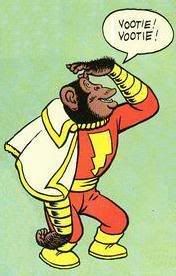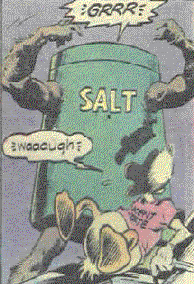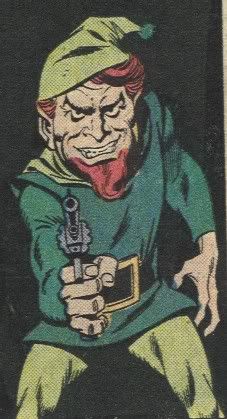The Ennis Smirk, the Miller Syncopation, and Kingese: Writer Tics
Plowing through the third trade paperback of Preacher, I started to quietly hum along with the Garth Ennis Smirk Rhythm. If you’ve read his work, you know what I mean.
Open up an issue of Preacher, Hellblazer, or Hitman. Look for a scene where the hero is talking to a buddy. Probably over beers. It'll go like this:
Panel 1: dramatic dialogue.
Panel 2: more dramatic dialogue, fraught with portent.
Panels 3-6: dialogue, growing drama, sense of danger.
Panel 7: Hero makes a wry comment, smirks, and lights a cigarette.
He sometimes wrote more than one of these per issue. That’s a lot of smug cigarette lighting.
Ennis lives for the wry smirking panel. Take that away from him, and he’d likely give up comics and write crossword puzzles. Sardonic, cigarette-smoking crossword puzzles.
Then there’s the Frank Miller Syncopation. The best use of it came in The Dark Knight Strikes Again, in Batman’s internal monologue.
Caption 1: This is bad.
Caption 2: Jerry says they’re gone.
Caption 3: Ran out of jerky.
Caption 4: Hope they still have peanuts.
You know that he sounds just like this in his own head. Tough-guy dialogue in short snippets with an emphasis on the last word: “I wake up. The city is a pit of sin. My fists ache to crush bone. Hey, where are my socks?”
And of course, there’s the famous Jack ”King” Kirby style: Kingese.
Kingese is overheated prose, every verb in boldface, and every damn sentence ending in an exclamation point. Plus, of course, Kirby's patented bizarro terminology. The Fourth World titles were written in fluent Kingese:
Caption: Trogdor tears down the steel door! Metal shreds beneath his power!
Trogdor: This day must not end with a Fire Penguin crushed by Strongbad!
Sookie: Hurry! The song of battle calls! I need a lozenge!
Caption: The Positron Lozenge cures the evils of hay fever!
Like beatnik poetry, Kingese has charm, but it reads like the work of a man for whom English was a fifth language, striving for eloquence after drinking two bottles of cough syrup.
...God, I love comics.
I’ve been working on my own stories lately. As I revise again and again to scrub out my repetitive wordings and rehashed dialogue, I take comfort that even the icons of the field fall victim to it.*
“A psychic hamster? Again? And why do half of your damn sentences begin with a gerund? Or split in the middle with a conjunctive ‘but?’”
-sigh-
Writing, she is hard.
Let me amend that: writing well, she is hard.
--------------
*I’m avoiding mention of Chris Claremont, longtime writer of X-Men. He was and remains the master of the writing tic. But I’ve never been a fan of Claremont or the X-Men, and I can’t bring myself to list out the Claremont Clichés. Anybody here want to take a crack at it?





8 Comments:
It's been a long time since I've plowed through the Claremont X-Men (the good ones, from the 70s and 80s and early 90s), but one Claremont tic leaps to mind: his annoying habit of boiling down his characters to a single phrase: Wolverine: "He's the best there is at what he does" (occasionally followed by, "and what he does isn't very nice"); and the new classic, Psylocke: Using her psychic knife, "the focused totality of her psychic powers." Sheesh, we get it, Claremont! You don't need to tell us every time!
By Greg, at 1:42 PM
Greg, at 1:42 PM
My least favorite Claremont dialogue cliches:
(the Psylocke "focused totality..." is my favorite)
-random insertions of a foreign character's native language into a sentence spoken in English.
-female characters calling other female characters "love;" everyone calling each other "my friend" or "old friend."
-characters giving mouth-to-mouth resuscitaion and thinking they need to "saturate their lungs with air."
-ending a "funny" story with "The ever-lovin', ever-livin' end."
-Starting a speech with "Hear me, X-Men!"
-Long sentences/ monologues broken up into several word balloons, often ending with three one-word balloons to emphasize dramatic pauses.
-If I were a 14 year-old girl and a hairy psychopath called me "pumpkin," I'd file charges.
-"Goddess!"
-Storm getting trapped somewhere and someone saying "Storm! Her claustrophobia!" followed by Storm breaking out with a big lightning bolt, saying something to the effect of "Free!" and then going crazy until someone (usually Kitty) reminds her how much they love her.
-anytime Claremont wrote Storm as a hardass who secretly needs love.
The sad thing? That's off the top of my head, without any Claremont books in front of me.
By Anonymous, at 8:08 AM
Anonymous, at 8:08 AM
Man, those are good. The insertion of German into Kurt's speech always bothered me, since I know enough German to know he usually got it wrong.
The "Goddess" thing cracked me up, as did the Storm claustrophobia thing - another instance of Claremont using one single thing to sum up a character's personality.
BTW, not to pimp myself or anything, but I'm having a contest at my own blog. If you don't own Scurvy Dogs, here's your chance to win it.
By Greg, at 3:57 PM
Greg, at 3:57 PM
Oh, you guys are HILARIOUS. Claremont almost ruined me on the spoken word, and I didn't even know it, because I was eight freaking years old.
While his "incantations" grew old after a while ("the smell of brimstone"--what the hell does BRIMSTONE smell like?) (etc., etc.), they did two things, at least one of them on purpose: first, and most importantly, those little asides let every new reader know exactly who the character was in a fairly complicated title.
Claremont's X-Men didn't always wear costumes and often used their personal names when speaking to each other. As a kid, this seemed so much more "real" to me--the X-Men were a family, not a super-hero response team like the Avengers. And they wore plaid shirts and got drunk.
So Claremont's verbal tics gave the new reader wondering who all the folks were an idea of what their powers were and tightly summed the up--a boon to any new reader.
I think he did that on purpose. What he did as well, and which has plagued everyone from Grant Morrison to Joss Wheedon, is that he defined the characters tightly and simply. For-ever, Wolverine has been defined by his Claremont tag. Could there be more to the character? Probably, but the formula works, and it was Claremont's.
Sometimes I think Marvel needs to build a giant statute of him next ot the ones they need to have of Jack & Stan. Um, maybe a little one. With his hands full of cash.
By gorjus, at 10:50 AM
gorjus, at 10:50 AM
Oh, you guys are HILARIOUS. Claremont almost ruined me on the spoken word, and I didn't even know it, because I was eight freaking years old.
While his "incantations" grew old after a while ("the smell of brimstone"--what the hell does BRIMSTONE smell like?) (etc., etc.), they did two things, at least one of them on purpose: first, and most importantly, those little asides let every new reader know exactly who the character was in a fairly complicated title.
Claremont's X-Men didn't always wear costumes and often used their personal names when speaking to each other. As a kid, this seemed so much more "real" to me--the X-Men were a family, not a super-hero response team like the Avengers. And they wore plaid shirts and got drunk.
So Claremont's verbal tics gave the new reader wondering who all the folks were an idea of what their powers were and tightly summed the up--a boon to any new reader.
I think he did that on purpose. What he did as well, and which has plagued everyone from Grant Morrison to Joss Wheedon, is that he defined the characters tightly and simply. For-ever, Wolverine has been defined by his Claremont tag. Could there be more to the character? Probably, but the formula works, and it was Claremont's.
Sometimes I think Marvel needs to build a giant statute of him next ot the ones they need to have of Jack & Stan. Um, maybe a little one. With his hands full of cash.
By gorjus, at 10:50 AM
gorjus, at 10:50 AM
Claremont put himself in a very difficult spot. He wrote in the seventies and eighties, when the mandate to "write every comic as though it were the reader's first" was still dogma, but he also pushed the soap opera angle of the characters farther than anyone ever had before.
Add in that it's a team book, and you have two very opposite needs clashing: repetition of origins and explanations for the new folks for each character, and pushing forward the long-running storylines.
In a solo book, the repetitions wouldn't be so tough, since he'd have to recap only one or two characters, and have one or two signature phrases. But a big team like the X-Men? Dang.
Then again, as Mike Loughlin points out, Claremont's tics extended a whole lot farther than the repetitive phrases and recaps.
By Harvey Jerkwater, at 9:43 AM
Harvey Jerkwater, at 9:43 AM
And, okay, in fairness, the Miller Syncopation is not something he uses all the time. He was striving for effect in The Dark Knight books, and gave Batman a distinct voice.
Lordy, did he beat it to death.
By Harvey Jerkwater, at 9:45 AM
Harvey Jerkwater, at 9:45 AM
Late to the party, but...
Weird. Illyana Rasputin had "focused totality", too. I didn't know about Psylocke's FT, I stopped reading before she came along.
Ain't that a kick in the head?
By Anonymous, at 8:46 PM
Anonymous, at 8:46 PM
Post a Comment
<< Home